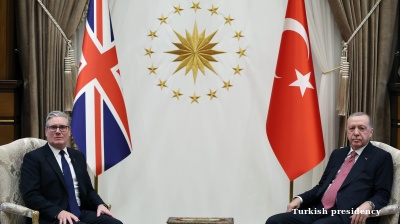Eurobonds of Istanbul-listed Zorlu units offer attractive yields amid rating downgrades and no default expectation
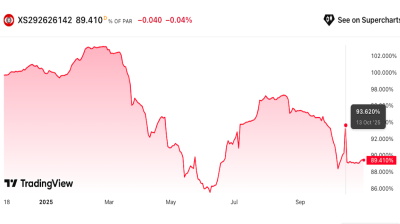
Fitch Ratings and Moody’s Investors Service last week simultaneously downgraded their outlooks on the credit ratings of Istanbul-listed electricity producer Zorlu Enerji (ZOREN), a unit of local conglomerate Zorlu Holding.
Currently, Zorlu Enerji has a B+/Negative rating, at four notches below investment grade, from Fitch Ratings and a B3/Stable rating, at six notches below investment grade, from Moody’s Investors Service.
Turkey’s sovereign ratings, meanwhile, stand at three notches below investment grade with stable outlooks.
Eurobonds offer 14-15% yield
Between October 2024 and March 2025, ZOREN raised $1.1bn with a debut eurobond (XS2926261426) sale that was followed by two tap issues.
The paper was priced at par in the auction held in October 2024. The price saw the 85s in June before rebounding back to the 96-97s in July.
Earlier this month, it jumped from the 88s to the 93s before slumping back to the 89s on November 14, one week before the outlook downgrade announcements.
On October 23, the company delivered the second coupon payment on the paper. The third coupon payment is scheduled for April 23, 2026.
The paper currently offers a 14-15% yield.
Zorlu Holding expects no default
In May, Bloomberg reported that Omer Yungul, CEO of Vestel Elektronik (VESTL) and Zorlu Holding, told an investor call that VESTL was planning layoffs, but it was not expecting a default.
In June, Fitch downgraded VESTL by two notches. VESTL now has a B-/Negative rating, at six notches below investment grade, from Fitch Ratings and a Caa1/Negative rating, at seven notches below investment grade, from Moody’s Investors Service.
In H1, Zorlu Enerji posted the largest loss of Borsa Istanbul-listed companies, reporting a net loss of Turkish lira (TRY) 8.4bn.
Vestel offers 24% yield
In May 2024, VESTL sold a $450mn 5-year eurobond (XS2817919587) at a coupon rate of 9.75%. In June 2024, the company sold an additional $50mn of the paper via a tap issue.
So far, VESTL has delivered two coupon payments, one in November and one in May. The third is scheduled for November 17. A default does not seem imminent.
The paper was priced at 99.516 in the auction held in May 2024. The price has been hovering in the 66-67s across this month.
The paper currently offers a 25% yield.
Turkey’s CDS remain below the 250-level, while the yield on the Turkish government’s 10-year eurobonds remains below the 7%-level.
ZOREN’s deleveraging slows
Fitch has revised ZOREN’s outlook to negative from stable while affirming its rating, the rating agency said in a statement on October 21.
The outlook downgrade reflected ZOREN’s weak interest coverage ratios due to slower-than-expected deleveraging on a gross debt basis as well as depleted leverage headroom in 2025-2026.
EBITDA interest rate coverage consistently below 2.0x or higher EBITDA net leverage than forecast would lead to a rating downgrade.
Fitch now forecasts ZOREN’s adjusted EBITDA interest coverage will average 1.8x in 2025-2026, which is low for the B+ rating and drives the negative outlook.
Focused on Turkey
ZOREN’s rating, meanwhile, reflects its limited scale of operations with the concentration on a single market, namely Turkey, as well as its increasing exposure to merchant prices (as feed-in tariffs gradually expire) and to FX risk.
On the positive side, the rating also reflects a high contribution of regulated and quasi-regulated businesses to EBITDA (more than 80% based on Fitch’s estimates), satisfactory regulatory frameworks for electricity distribution (OEDAS) and contracted renewables.
Eurobond used for growth
More of the new debt issued in 2024 was used for growth rather than debt repayment, compared with the original plan, resulting in a net debt $125mn higher than Fitch’s forecast at end-2024.
Fitch therefore expects interest payments to exceed 63% and 50% of EBITDA in 2025 and 2026, respectively (66% in 2024), while forecasting total debt will reach $1.3bn by end-2026.
The rating case assumes all remaining asset disposal proceeds are used for debt repayment, in line with Zorlu's medium-term target to gradually lower net debt/EBITDA to 3.0x.
Higher capex in distribution
ZOREN increased its capital expenditures (capex) in 2025, mainly in distribution.
The company, meanwhile, completed the Israel-based Dorad Power Station stake sale in 2025 for $210mn vs a $150mn forecast.
The collected proceeds mainly funded additional distribution capex ($50mn), fees and debt reduction.
Another $40mn related to the sale remains in escrow, which the company expects to collect in 2026, albeit it is not included in Fitch’s rating case.
The company plans to use these funds together with the proceeds from its Pakistani assets to be sold in 2026 to repay debt. Fitch assumes total divestment proceeds of $200mn across 2025-2026.
Turkey risks
The rating also reflects Turkey’s high inflation and the exposure of the regulatory framework to political interference.
At end-June, about 91% of ZOREN's debt was in USD and EUR while a large share of EBITDA was in lira. FX risk is mitigated by dollar-linked revenues, with 32% of 2024 EBITDA tied to YEKDEM (renewable energy resources support mechanism) and by CPI-linked EBITDA in regulated operations.
However, a mismatch persists between Turkish CPI and the USD/TRY exchange rate trends.
Fitch expects ZOREN to generate about 83% of its 2025 EBITDA from regulated (57%) and contracted (26%) activities, supporting earnings predictability. This share will drop to about 72% by end-2028 as YEKDEM expires for some renewables plants.
Fitch views Turkish electricity distribution regulation as moderately resilient compared with other emerging markets, but more exposed to political risk than western Europe.
Peers
Czechia’s ENERGO-PRO (BB-/Negative), a utility company headquartered in the Czech Republic with units in Bulgaria, Georgia, Turkey and Spain, has higher debt capacity than ZOREN and a stronger business risk profile.
This is mainly driven by better geographical diversification (operations in three countries), a slightly larger scale and a higher share of regulated and quasi-regulated businesses.
Greece’s Public Power Corporation (PPC, BB-/Stable) is the incumbent integrated utility in Greece and one of the largest in Romania. The one-notch rating difference with ZOREN mainly reflects its much larger scale and generation capacity as the incumbent in Greece.
This is partially offset by ZOREN’s higher percentage of EBITDA from regulated and quasi-regulated businesses.
ZOREN has higher debt capacity than its two Turkish peers, namely Aydem Yenilenebilir (AYDEM, B/Positive) and Limak Yenilenebilir (Limak, BB-/Negative), mainly due to its regulated distribution business.
Moreover, Aydem's and Limak's exposure to hydro leads to more volatile generation volumes than ZOREN’s generation from geothermal.
ZOREN also has a higher share of quasi-regulated EBITDA under YEKDEM than Aydem while it is comparable with that of Limak.
The rating difference with Limak Yenilenebilir reflects the latter's significantly lower leverage with a funds from operations (FFO) net leverage of 1.9x at end-2024 (although it is expected to increase), compared with 3.5x for Zorlu. Both issuers have weak interest coverage ratios for their ratings.
Moody’s agrees
Moody's, meanwhile, downgraded ZOREN’s outlook to stable from positive while affirming its rating, the agency said on October 21.
The downgrade considers ZOREN's financial performance and progress on asset disposals in the context of its debt burden of some $1.4bn at end-June.
The company's cash flows will be supported by the receipt of proceeds from disposals but deleveraging will be slower than previously anticipated.
Cash flow below interest payments
In 1H, ZOREN reported a decline in earnings and increase in leverage. The operating cash flow was weaker than expected due to a 7% reduction in net generation from renewable power plants and a decline in wholesale power prices.
Given ZOREN's relatively high cost of debt, operating cash flows of Turkish lira (TRY) 3.5bn were insufficient to cover interest payments of TRY 4bn during this period.
Free cash flow was negative, leading to an increase in the company's borrowings to TRY 54bn as of end-June.
Moody’s expects ZOREN's cash flow to strengthen in the second half of this year due to the full impact of the 34.5% increase in the distribution tariff that was implemented in April as well as already received net proceeds of some $160mn from the disposal of its 25% stake in the Dorad power plant.
However, given an increase in investments, estimated at some $140mn this year, Moody’s expects only a relatively modest decline in borrowings.
YEKDEM to expire
In 2026, Moody’s expects power generation cash flows to decline as the feed-in-tariff support for the Alasehir geothermal power plant will have expired and average wholesale power prices are significantly lower than the feed-in-tariff.
Although ZOREN's distribution company significantly increased its investments this year, Moody’s anticipates that the company will need to return some money to the system through tariffs in the next tariff period because of past underspending against regulatory allowances.
There is, however, uncertainty around the evolution of distribution earnings pending regulatory determination for the next tariff distribution period 2026-2030. On disposals, ZOREN could receive another $40mn.
Data
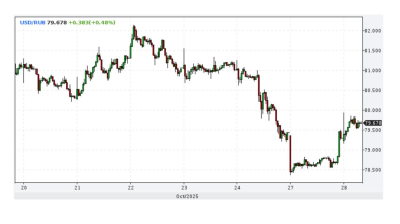
Ruble strengthens as sanctioned oil companies repatriate cash
The Russian ruble strengthened after the Trump administration imposed oil sanctions on Russia’s leading oil companies, extending a rally that began after the Biden administration imposed oil sanctions on Russia in January.

Russia's central bank cuts rates by 50bp to 16.5%
The Central Bank of Russia (CBR) cut rates by 50bp on October 24 to 16.5% in an effort to boost flagging growth despite fears of a revival of inflationary pressure due to an upcoming two percentage point hike in the planned VAT rates.
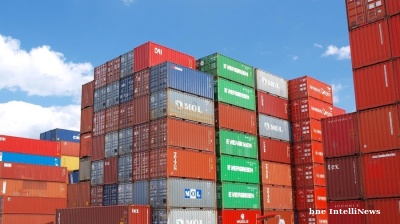
Ukraine's trade deficit doubles to $42bn putting new pressure on an already strained economy
Ukraine’s trade deficit has doubled to $42bn as exports fall and imports balloon. The balance of payments deficit is starting to turn into a serious problem that could undermine the country’s macroeconomic stability.
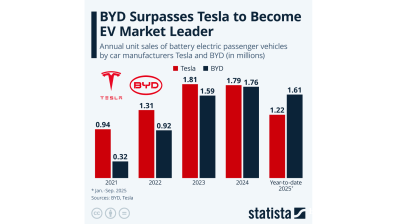
BYD surpasses Tesla to become EV market leader – Statista
While Chinese manufacturer BYD already pulled ahead of Tesla in production volume last year, with 1,777,965 battery electric vehicles (BEV) produced in 2024 (4,500 more than Tesla), the American manufacturer remained ahead in sales.
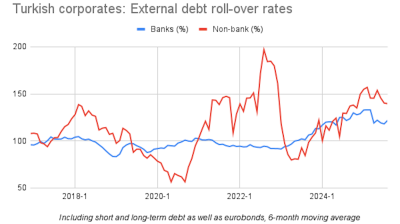
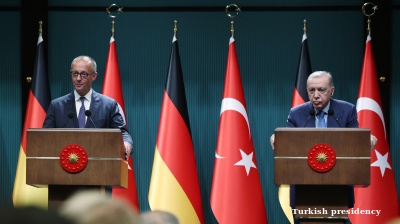
_Cropped_1761809941.jpg)
